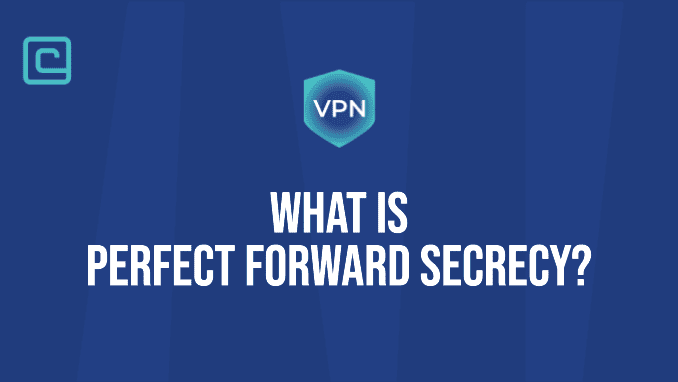What is PFS (Perfect Forward Secrecy)? Which VPNs Have It?

From shielding your data against key compromises to enhancing privacy and thwarting retroactive decryption, Perfect Forward Secrecy (PFS) empowers you with forward secrecy, ensuring that your VPN communications remain secure even in the face of unforeseen vulnerabilities.
But how does Perfect Forward Secrecy work? And which VPNs provide this vital security feature? Let’s dive into the world of Perfect Forward Secrecy and explore everything you need to know about this confidentiality feature.
Join us as we delve into the inner workings of PFS, its benefits and drawbacks, and discover the VPNs that have embraced this essential security measure to safeguard your digital presence.
What Is Perfect Forward Secrecy? – PFS Explained
Perfect Forward Secrecy, also called forward secrecy, is a cryptographic property that ensures the confidentiality of past communication sessions even if the server’s private key is compromised.
It achieves this by generating unique, session-specific short-lived keys for each individual session initiated by the user. These keys are not derived from the long-term keys used during the initial key exchange. Instead, they are randomly generated and discarded after the session is complete. This means that any given session key is practically useless to a hacker who gets ahold of it.
By using ephemeral keys, PFS prevents retrospective decryption of past sessions. Even if an attacker gains access to a session in the future, they cannot decrypt previous sessions or get ahold of additional secret keys to access data because the session-specific keys are no longer available. PFS adds an additional layer of security, as this forward secrecy guards against the compromise of long-term keys.
The main idea behind PFS is the generation of unique session keys for each communication session. Additionally, it also mitigates the dangers of stolen private keys by implementing a key exchange algorithm separately from the encryption system.
Typically, web servers use special encryption keys that remain the same during the entire communication process. In this case, if the attacker reveals the server’s private key, they can use the same key to decrypt all communication between the client and the server. PFS enables the use of private keys that are short-term.
When two parties establish a secure connection, they agree upon a shared secret key using a key exchange protocol. The client creates a pre-master secret and encrypts it with the corresponding public key. Once the server receives the encrypted pre-master secret, it uses the private key to decrypt it.
In the case of PFS, the key is not directly used for encryption. Instead, ephemeral keys are generated for each session. These temporary keys are randomly generated without prior knowledge of either party, limiting exposure during key exchanges.
Test Your VPN Knowledge – Take A Quiz!
How Does Perfect Forward Secrecy Work?
The definition of PFS and everything that comes with it might sound too complicated. So, to simplify the process of how PFS works, here’s a straightforward real-life example of how PFS works.
Let’s say that two users, Barry and Sally, are texting each other using an app that utilizes PFS. The app identifies Barry and Sally as two individuals that want to communicate with each other and uses public and private keys to help them identify each other.
Then, a temporary key is created when Barry sends Sally a message. Sally decrypts the message using the session key negotiated at the start of the communication process. This process repeats, and Barry and Sally exchange related encryption keys with every message sent, with each message having new session keys.
How to Enable Perfect Forward Secrecy?
Configuring forward secrecy is fairly straightforward, as it is present in several major protocol implementations. You can enable Perfect Forward Secrecy on sites that use both Secure Socket Layer (SSL) or Transport Layer Security (TLS) sessions. Neither of these protocols mandates an encryption cipher or the actual key exchange.
Rather, the user and server machines agree on the secure encryption type. So, when enabling perfect forward secrecy, the client and server should make compliant cipher suites. In Transport Layer Security, cipher suites based on Diffie–Hellman key exchange and elliptic curve Diffie–Hellman are available.
However, it’s also essential to remember that you shouldn’t simply enable support for Ephemeral Elliptic Curve Diffie-Hellman (ECDHE) or Ephemeral Diffie-Hellman (DHE) without enforcing the cipher order.
While this might sound pretty technical, don’t worry. Most modern servers are already configured for PFS. To see whether perfect forward secrecy is enabled, check the security details of a site.
You can inspect the decrypted text from the session’s key agreement phase. If the app or site supports FPS, it will not reveal the encryption key. If the server isn’t configured, you’ll have to locate the SSL protocol configuration, add the protocol, and set the SSL cipher.
That said, what can pose the issue is prioritizing other security methods over Perfect Forward Secrecy. This includes halting long-duration session tickets that can hold the user’s session data for extended periods.
To make sure you implement Perfect Forward Secrecy without any problems, you might need to stop other security tools to ensure weaker encryption doesn’t interfere or take over. Always prioritize Perfect Forward Secrecy when using it.
Read next: What is WireGuard?
Benefits of Perfect Forward Secrecy
Perfect Forward Secrecy provides several significant benefits in terms of security and privacy in communication protocols. Here are the PFS VPN benefits:
- Protection Against Key Compromise — PFS ensures that even in the event of a long-term secret key compromise, previous communication sessions remain secure. Since unique short-lived keys are generated for each session, compromising the long-term keys does not allow an attacker to decrypt past sessions, as the session-specific keys are discarded.
- Resilience Against Cryptographic Attacks — PFS limits the impact of key compromises, such as the theft or disclosure of long-term keys, by isolating the encryption used for each session and preventing an attacker from decrypting multiple sessions. It also discourages hackers from attempting brute-force attacks, which can break into even very secure encryption.
- Compliance With Privacy Regulations — PFS is often required or recommended by privacy regulations and standards. By implementing PFS, organizations can demonstrate a commitment to protecting user privacy and ensuring the security of sensitive data. For instance, the Internet Engineering Task Force already mandated PFS.
Drawbacks of Perfect Forward Secrecy
Perfect Forward Secrecy offers significant advantages in terms of security, but it isn’t without its disadvantages. Here are a few drawbacks associated with its implementation:
- Increased Computing Power — Generating unique ephemeral keys for each session requires additional computational resources compared to reusing the same encryption keys. The generation and exchange of temporary keys add extra complexity and processing time to the cryptographic operations, which can impact performance, especially in high-volume or resource-constrained environments.
- Potential Compatibility Issues — PFS relies on specific cryptographic protocols and algorithms to generate and exchange ephemeral keys. Ensuring compatibility between different systems and applications can be challenging, especially when interoperability between different implementations or versions is required. This can pose obstacles when implementing PFS in heterogeneous environments.
- Lack of Communication Oversight — PFS doesn’t only protect your communication from malicious users. It also prevents your network team from decrypting traffic and troubleshooting network problems. This can make the problem-solving process significantly longer and more difficult.
When Should You Use Perfect Forward Secrecy?
You should consider using and implementing Perfect Forward Secrecy in situations where enhanced security and privacy of data transmission are desired. Here are some scenarios where PFS is recommended:
- Secure Communications — PFS is highly recommended in any scenario where secure communications are essential. This includes sharing sensitive data, confidential transactions, or any communication that requires protection against unauthorized access or data interception.
- VPN Connections — If you use VPNs for secure online activities, PFS should be utilized. It adds an extra layer of protection to VPN connections, ensuring that even if long-term keys are compromised, previously transmitted or future data remains secure.
- High-Risk Environments — In high-risk environments where the potential for key compromise is greater, such as public Wi-Fi networks or regions with elevated cybersecurity threats, PFS is particularly important. It can help you mitigate the impact of key compromises and strengthen the overall security posture.
- Long-Term Security — When long-term security and confidentiality of data are paramount, PFS should be used. By generating unique session keys for each session, PFS ensures that the compromise of a single session key does not jeopardize the security of previous or future sessions.
How Do VPNs Use Perfect Forward Secrecy?
Through the unique key exchange protocol, the client and server each generate their unique session key. These keys are generated based on the combination of the client’s private key and the server’s public key.
The client and server then exchange their generated session keys, enabling both parties to have a shared secret without ever transmitting it over the network. This shared secret is used for symmetric encryption during the VPN session.
Once the session keys are established, the client and server use them to encrypt and decrypt the data transmitted during the VPN session. The session keys are unique to that specific session and are not reused.
The Best PFS VPN Providers To Protect Your Online Privacy
If you want to use a PFS VPN for anonymity and more secure connections, there are several trustworthy options you can explore.
Here are some of the best Perfect Forward Secrecy VPN services:
- NordVPN – The Best VPN with Perfect Forward Secrecy.
- Surfshark – Cutting-edge encryption and PFS.
- Atlas VPN – Uses advanced Perfect Forward Secrecy protocols.
- PrivateVPN – Has PFS and Port Forwarding available.
- ExpressVPN – A great Premium VPN with PFS.
Can Perfect Forward Secrecy Be Compromised?
Yes, while secure, PFS is not entirely immune to vulnerabilities. If an attacker can read long-term security keys and modify the session key generator, they could gain access to future communication. That said, all previous traffic will still stay protected.
Perfect Forward Secrecy VPN vs. Traditional VPN – Which Is Better?
A PFS VPN is better suited when long-term confidentiality and protection against key compromises are paramount, providing an additional layer of security against potential future compromises. With a traditional VPN, when the user initiates a session, the same special key is used for the entire duration of the exchange.
While there’s nothing wrong with using a traditional VPN, a PFS VPN is just a bit safer. By generating a unique encryption key for each communication session, a PFS VPN brings extra security and protection for users who want to stay extra careful online. A traditional VPN is still a suitable choice for general privacy and security needs, such as anonymous browsing and protection on public networks.
Related articles:
Perfect Forward Secrecy FAQs
Why is Perfect Forward Secrecy (PFS) important in a VPN?
The importance of Perfect Forward Secrecy in VPN service is undeniable because it ensures that previously encrypted data is secure in the event of a compromise of long-term keys. It prevents retrospective decryption, safeguarding the data from past sessions.
Which VPN providers offer Perfect Forward Secrecy?
Not all providers utilize Perfect Forward Secrecy in their services. Some of the best providers that offer this feature are NordVPN, Surfshark, and ExpressVPN. All three of these VPNs are safe and maintain a trustworthy reputation in the industry.
How does Perfect Forward Secrecy in a VPN compare to regular VPNs?
Perfect Forward Secrecy provides added security in VPNs compared to regular VPNs. While regular VPNs use a single encryption key to protect data transmission, PFS generates a unique session key for each session. PFS protects against long-term key compromises.
Does using a Perfect Forward Secrecy VPN guarantee online privacy?
Using a Perfect Forward Secrecy VPN does not guarantee online privacy. While PFS enhances a VPN’s security by ensuring that past and future sessions remain secure even if the long-term key is compromised, it only addresses the privacy of data transmission.
What is the Difference between Perfect Forward Secrecy and a VPN?
Perfect Forward Secrecy is a cryptographic property that ensures that even if an attacker obtains the long-term private key, they cannot decrypt past or future sessions. On the other hand, a VPN is a technology that creates a secure and encrypted connection.
What is Perfect Forward Secrecy in a VPN?
Perfect Forward Secrecy in a VPN is a security mechanism that enhances the confidentiality and integrity of data transmission. It achieves this by generating unique session keys for each VPN session, independent of the long-term private key.
What are PFS session keys?
In PFS, session keys are unique keys generated for each VPN session. These session keys are short-lived. During the key exchange, the client and server independently generate their session keys based on a combination of private and public keys.
How does key exchange work in Perfect Forward Secrecy?
In Perfect Forward Secrecy, the key exchange process involves the generation and exchange of unique, session-specific keys. During the key exchange, the client and server negotiate a shared secret key, typically using a Diffie-Hellman key exchange protocol.
What can attackers do with my session key?
If a hacker obtains your session key, they can use the stolen keys to decrypt intercepted data, perform session hijacking, monitor future communication, conduct man-in-the-middle attacks, and impersonate you within the communication session.
Cybersecurity and VPN researcher

